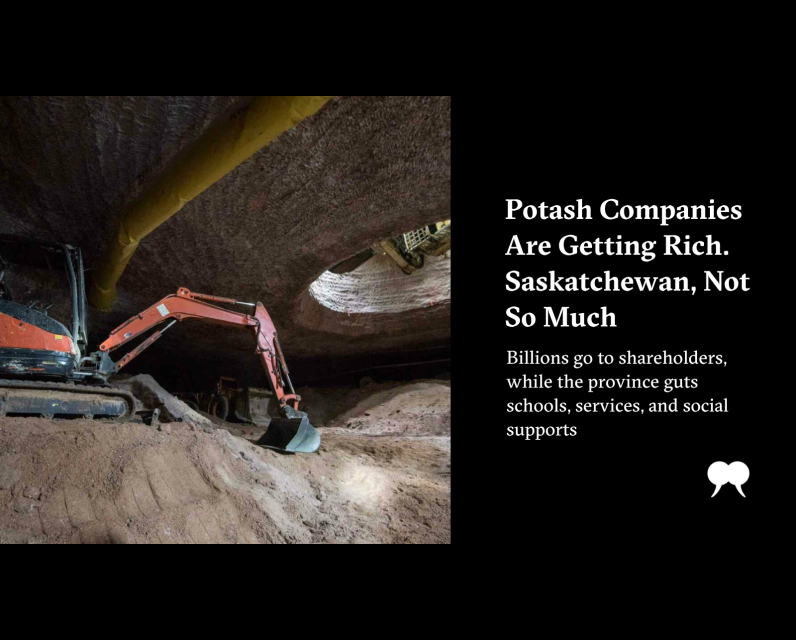Potash Companies Are Getting Rich. Saskatchewan, Not So Much

Given US president Donald Trump’s imposition of tariffs and musings about Canadian sovereignty, it’s tempting to argue that Canada should respond in kind by tightening the taps on critical exports. Oil and hydroelectricity are often mentioned as pressure points. But there’s another resource, less talked about yet just as strategically vital: potash.
Potash isn’t just a commodity. It’s a pillar of the planet’s food system. Along with nitrogen and phosphates, the potassium it provides is critical for fertilizer. Without fertilizer, global crop yields would collapse—by as much as half. That makes Saskatchewan, home to the world’s largest potash reserves and eleven operating mines, one of the quiet power centres of modern agriculture. And nowhere is that dominance more obvious than in the United States, where farmers are deeply reliant on Canada—nearly 80 percent of their supply comes from us. In any serious conversation about economic leverage, this material should be near the top of the list.
But as a former Saskatchewan finance minister, I believe such measures would be counterproductive. Americans facing brownouts from reduced electricity supply, or higher energy costs due to oil export limits—or, in this case, rising food prices from pricier potash—may quickly turn their frustration toward Canada. Trump would happily exploit the situation, turning us into a villain, perhaps garnering support for extreme measures.
Like his Russian counterpart, Vladimir Putin, Trump has dreams of imperial expansion fuelling his self-image as one of the greatest leaders and visionaries of all time. A year ago, it was unthinkable that US aggression against Canada might occur. Now our only certainty is that nothing is certain, including minor things like rule of law and the American constitution. Canada would not want to play into Trump’s hands.
But while Canada doesn’t need to pick a fight with the president, it does need to prepare. And that preparation starts at home. With regard to potash, the issue isn’t about security of supply. Our reserves are estimated at 4.5 billion metric tonnes of recoverable ore, which, at recent levels of production, would last over 200 years; exploration and assessment will undoubtedly add more reserves. But, for years, experts across the political spectrum have pointed to the same glaring imbalance: potash companies rake in enormous profits while paying remarkably little in royalties and taxes. The problem isn’t new, but the cost of doing nothing is growing fast.
No one disputes that the industry should earn a solid return on investment. Since the opening of the first commercial mine at Patience Lake in 1958, potash has played a valuable role in Saskatchewan’s economy, generating well-paying jobs and significant spinoff activity. But alongside that, the public has a right to expect their fair share from what’s being pulled out of the ground. And right now, it isn’t getting one. If we’re serious about strengthening domestic well-being and prosperity, that is one place to start.
With one-third of global reserves, Saskatchewan is the Saudi Arabia of potash. If Saudi Arabia can dominate the oil market with about 16 percent of world reserves, and Norway can parley its less than half a percent of the market into a $2.6 trillion sovereign fund and enviable social supports for its citizens, then the people of Saskatchewan should expect great results from their potash wealth.
Realizing that potential, however, depends on a crucial principle: capturing the windfall. The theory of economic rents, when applied to publicly owned resources, suggests that companies should recoup enough to cover their costs and make a fair profit—enough, in other words, to justify the risk and keep the operation running. But anything beyond that—any gains that come not from ingenuity or effort but from privileged access to a finite asset—should flow back to the public. That’s because the outsized earnings these companies are making is money that arguably belongs to everyone.
In 1974, when the world price of oil nearly quadrupled, oil companies in Alberta and Saskatchewan were set to reap massive profits under their government leases. Premiers Peter Lougheed of Alberta and Allan Blakeney of Saskatchewan—Progressive Conservative and New Democrat respectively—invoked the Crown’s legislative power to amend the leases retroactively. The move redirected the surplus from corporations to the public.
When it came to potash, however, Saskatchewan took the opposite path. For decades, potash mining companies were making healthy returns. In 2007, the annual report of the Potash Corporation of Saskatchewan (PCS, now known as Nutrien) stated the company was “thriving” and “in a very strong financial position.” But when the potash boom came, politicians did nothing. Surging demand from China and India caused prices to soar from $172 per metric tonne at the start of 2007 to $875 by mid-December 2008 (in both countries, rising prosperity pushed farmers to use more fertilizer to meet increased demand for food). The result was a massive giveaway: of a nearly $5 billion in profit in 2008, companies kept $4 billion. Instead of amending or updating the royalty and tax system, leaders let private interests pocket the gains.
And the cost of that inaction keeps growing. Since 2008, Saskatchewan has forgone hundreds of millions or, in some years, billions of dollars. The most extreme example occurred in 2022. Revenue surged to more than $18 billion as potash prices doubled from the year before. (This was largely due to sanctions on Russia following its invasion of Ukraine, which reduced the global amount of potash available, forcing buyers to turn to Canada to fill the gap.) The 2022 spike led to a $10.4 billion haul. The Saskatchewan government took about $2.4 billion, leaving $8 billion for the companies. Is it any surprise that the industry, owned almost entirely by out-of-province shareholders, have become Saskatchewan’s most profitable business?
Potash companies aren’t to blame for tax policy, even as they lobby to maintain it. Their job is to maximize shareholder returns. It’s the government’s job to look after the public interest, and it has failed. While politicians occasionally claim they “don’t pick winners and losers,” Saskatchewan’s tax structure tells a different story. The sine qua non of any tax system is that when income rises, taxes to be paid should go up as well. But the marginal effective tax rates—taxes triggered by extra income, also known as METR—applied to different industries reveal clear disparities: oil and gas pays 37.1 percent; communications, 35.5 percent; construction, 31.9 percent; and other services, 31.1 percent. Meanwhile, potash companies, for no clear reason, enjoy an METR ranging between -0.4 and 21.9 percent.
It’s a double standard that hits everyone else. A trucker, hotel owner, or construction company pays a higher marginal rate than a potash multinational, as do most individuals. In 2021, potash companies earned $8 billion and paid nearly 20 percent of it in provincial taxes and royalties. In 2022, revenue jumped to $18 billion—yet their effective provincial payment dropped to just 16 percent. Revenue goes up; overall tax rate goes down. Not many businesses or individuals get that kind of deal.
And the deal doesn’t make any sense. The mishmash of various tax instruments relating to the potash industry and how that industry deducts capital expenditures is such that when you apply them to certain circumstances, you get incomprehensible results. In 2013, economists Jack Mintz and Duanjie Chen wrote that Saskatchewan’s potash royalty and tax system “has actually reached the point of incoherence and absurdity, or a mess.” Twelve years have since gone by, with little change in approach.
As potash companies have enriched themselves to an unprecedented degree since 2008, the provincial sales tax burden on average people and businesses in Saskatchewan doubled. The provincial debt ballooned from approximately $11 billion to $32 billion during the same period. The government was unable to balance the budget in nearly every year, even in good times.
When governments face financial shortfalls, one might expect the wealthiest to be asked to contribute more to the common good—especially those enriched by access to public resources at a discount. Saskatchewan chose other options. The province fell from first to seventh in per-student education spending. It cut payments for school supplies to children on welfare. It ended direct payments of rent and utility bills for people on social assistance—moves that triggered record evictions and fuelled a surge in homelessness.
Saskatchewan, home to one-third of the world’s potash reserves, a large producer of conventional oil in Canada, home to the country’s only active uranium mines, and blessed with almost 40 percent of the nation’s arable land, is worst or second worst in the areas of family poverty, child poverty, incarceration, youth incarceration, and educational outcomes. It has the second highest percentage of Indigenous people, many of whom live in poverty. It is difficult to be confident that current social policies and conditions will prepare the next generation for successful lives.
Miguel Sanchez, co-author of the Saskatchewan Child and Family Poverty Report, told the Regina Leader-Post in 2021 that despite raising concerns year after year, he saw “continuity of the same sociopolitical economic model that seems to privilege private interest over public interest, and over people.” It is hard to understand why companies and shareholders posting huge profits are favoured over Saskatchewan’s own people. The present government appears to have a general view that what is good for big businesses is somehow good for citizens, without thinking too clearly about the implications of where the money is really going. A review of the “the entire potash taxation and royalty regime” was announced in Saskatchewan’s 2015 budget address. That never happened. Ultimately, the government came to the conclusion everything was fine.
To be clear, I am not some crazy anti-capitalist. When I was a minister of the Crown in an NDP government from 1995 until 2007, oil and gas taxes were revised to create a level playing field with Alberta. Incentives to potash companies were provided in 2003, when they were not receiving big paydays, to encourage refurbishment of existing mines as well as mine expansions. Corporate capital taxes and the sales tax were reduced.
I’ve never opposed a reasonable rate of return for investors. But “reasonable” does not include giving resources away. Some might claim increased taxes will mean job losses. That is fear mongering. It is true that, according to the StarPhoenix, potash companies have an annual payroll in Saskatchewan of somewhere over $900 million. That does not appear to be overly onerous given the billions of dollars taken in each year.
So, yes, Saskatchewan should care about the interests of investors and shareholders. But it should also care about feeding its children, educating its young, caring for its sick, and keeping its people housed. If the tax system demands less from the industries profiting most, it demands more from everyone else. Public debt grows. Services shrink. The people who built the province are left paying the price, while wealth leaves with the shareholders.
Saskatchewan’s vast potash reserves offer a rare chance to build real resilience: a healthier, safer, and more equal economy strong enough to resist external pressures, including US encroachment. The province has the means to deliver quality education, health care, and housing—to end poverty and to strengthen working families and industries beyond potash. But it will take courage: the courage to put the public good first, to stop squandering a once-in-a-generation resource, and to build the kind of society that can stand on its own.
The post Potash Companies Are Getting Rich. Saskatchewan, Not So Much first appeared on The Walrus.


Comments
Be the first to comment